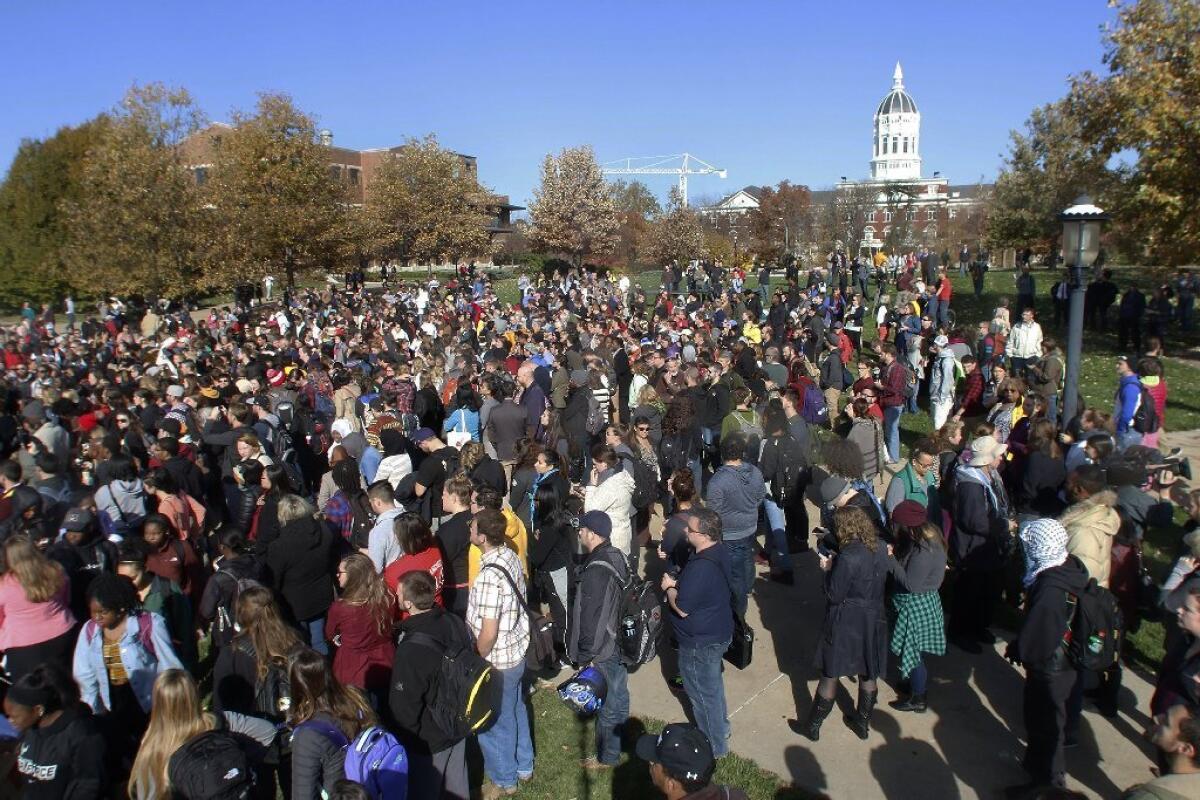Opinion: No safe space for reporters at University of Missouri protest

Protesters gather at Mel Carnahan Quadrangle at the University of Missouri on Monday.
- Share via
On Monday evening my Twitter feed included several mostly laudatory references to the University of Missouri student activists who had succeeded in forcing the resignation of the university’s president. But then there was a dramatic shift occasioned by news of a confrontation between protesters and journalists.
As my colleague Matt Pearce reported:
“The warning signs circle the protesters’ tent encampment like guard towers: No media allowed. The activists say the tent city is meant to be a safe space. One problem: The tents are in the middle of a public, 1st Amendment-protected university quad.
“The story of a student uprising led by black activists at the University of Missouri took an unexpected turn Monday when protesters and student journalists got into a clash over access. A video of protesters surrounding and shoving a student photographer out of the way has since prompted indignation from journalists who say activists have gone to such great lengths to protect their own privacy and space that they have infringed on the rights of others.”
Some of that indignation showed up on Twitter, where journalists checked in to chastise the students for their inadequate understanding of the 1st Amendment.
A Twitter storm also thundered over the head (and CV) of Melissa Click, an assistant professor of mass media who can be seen on a video telling a videographer “You need to get out” and then shouting to other protesters “Who wants to help me get this reporter out of here? I need some muscle over here.”
Soon Click’s detractors were sharing the fact that she wasn’t a professor at Missouri’s renowned journalism school (though she had a “courtesy appointment” at the J School). In fact, Click’s specialty is popular-culture texts and audiences. She has studied the popularity of “Fifty Shades of Grey,” an achievement the university’s PR department was keen to publicize.
Some of the tweets Monday night linked to the resume and portfolio of Tim Tai, 20, a senior photojournalism student who was working on assignment for ESPN. Tai wanted to chronicle the story of how the protest fitted into other demonstrations by black activists, but he wasn’t welcome. “You don’t have a right to take our photos,” a demonstrator told him.
Journalists have continued to close ranks against the protesters’ media-unfriendliness. In the Columbia Journalism Review, Jonathan Peters, a lawyer and assistant professor of journalism at the University of Kansas, invited Click and a university official who told Tai to “back off” that they were welcome to audit the course he teaches on the 1st Amendment. Erik Wemple, who blogs about the media for the Washington Post, wrote that university employees who failed to stick up for free speech “should lose their jobs as a result.”
So was this another example of the tendency of journalists to think that it’s all about us? To some extent, perhaps; we journalists can be prickly and pompous. But you don’t have to be a journalist to feel uneasy about protesters commandeering a public square and hassling journalists who are trying to record a public protest.
Fortunately, the criticism the protesters received seems to have done some good. The St. Louis Post-Dispatch is reporting that the main student protest group, Concerned Student 1950, handed out leaflets asking protesters to welcome reporters. The handout says “1. Media has a 1st Amendment right to occupy campsite. 2. The media is important to tell our story and experiences at Mizzou to the world.”
And on Tuesday, Click released a statement in which she said that “I regret the language and strategies I used, and sincerely apologize to the MU campus community, and journalists at large, for my behavior, and also for the way my actions have shifted attention away from the students’ campaign for justice.”
Some will see these second thoughts as capitulation to criticism and media bullying; I’d prefer to think that the protesters and Click realized that they were wrong. I hate the cliché “teachable moment,” but maybe that’s what this was.
Follow Michael McGough on Twitter @MichaelMcGough3
More to Read
A cure for the common opinion
Get thought-provoking perspectives with our weekly newsletter.
You may occasionally receive promotional content from the Los Angeles Times.










